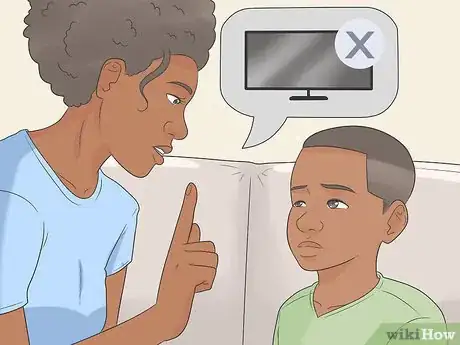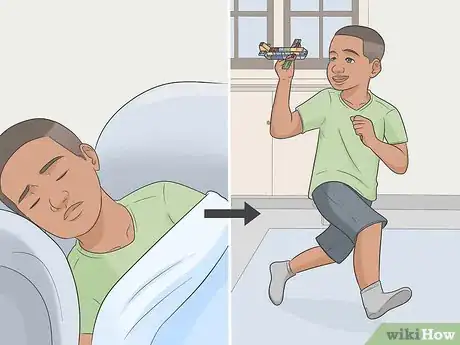This article was co-authored by wikiHow Staff. Our trained team of editors and researchers validate articles for accuracy and comprehensiveness. wikiHow's Content Management Team carefully monitors the work from our editorial staff to ensure that each article is backed by trusted research and meets our high quality standards.
There are 12 references cited in this article, which can be found at the bottom of the page.
This article has been viewed 449,840 times.
Learn more...
Kids want to fake sick every once in a while, and most don’t have the sophisticated tactics of Ferris Bueller. Some kids fake sick because they’re bored with or struggling with schoolwork; some kids fake sick because they’re being bullied; and sometimes, kids just need a break. Debunking someone’s claim to illness is not an exact science, but below are some suggestions if you suspect your child is faking.
Steps
Checking for Symptoms
-
1Ask what symptoms the child has. Children who describe vague symptoms that move from one body part to another without discretion are often faking.
- If, on the other hand, their symptoms are concrete and typically go together—like a runny nose and a sore throat, or stomach pain and diarrhea—that’s not a red flag.
- Ask your child twice for their symptoms. If they change up their complaints the second time, they're most likely faking and forgot the symptoms they made up the first time.
-
2Check their temperature. Don’t leave the room after handing your child the thermometer. Many children have gotten out of going to school by running the thermometer under the hot tap or holding it up to a hot lightbulb.
- Take their temperature a second time a few minutes later. It is extremely hard to keep a fake fever going when they've used a hot towel or drank a warm beverage.
Advertisement -
3Listen for the sound of vomiting and check for the smell of vomit. If your child says they've been throwing up, you will probably be able to hear and see it.
-
4Look for clammy skin. Does your child look pale and clammy? Clammy skin is caused by a number of factors, including allergic reaction, severe pain, anxiety, dehydration, and pneumonia.[1]
-
5Ask if you can touch their tummy. Sometimes children complain of a belly ache. If they won’t let you touch their tummy and refuse to eat or drink, they may be having abdominal pain.
- Abdominal pain can be caused by constipation, viral infections, and occasionally something more serious. Call your doctor if your child has prolonged abdominal pain.
-
6Check their eyes. If your child's eyes look red, pink, or watery, ask them if their eyes are bothering them. While it could just be allergies, if it looks crusty, it might be pink eye.
- If your child has pink eye, take them to the doctor. This viral infection can be very contagious.[2]
Observing Energy Levels
-
1Suggest going to the doctor or taking medicine. Even those children who don’t like doctors or medicine will agree to do whatever they need to in order to feel better. If your child refuses care, it’s probably because they don’t need it!
-
2Notice if your child appears excited to stay home. If they went from droopy-eyed to bright-eyed, they may be looking for a day catching up on “Arthur.”
- Keep an ear out for any mention of homework. If they squeal with delight at the thought of not having to do any today, this might be a sign that they are trying to avoid something.
-
3Restrict your child’s activities. Don’t incentivize staying home. If staying home sick means special treats and a day of television, they won’t mind falling behind in school. [3]
- Sick days are meant for resting and recuperating, which can include watching television to entertain yourself during the process. However, if your child is extremely alert while watching T.V., instead of lying on the couch and watching through squinting, resting eyes, they may have another motive.
-
4Notice if they have increased energy later in the day. So you said they could stay home, and after twenty minutes of extra sleep they're playing with LEGO and running around. They may have fooled you once, but they won’t fool you again.
Probing for Information About the School Day
-
1Ask your child what would be going on in school today. Take note if your child conveniently gets sick on the day of the US Constitution test. If they didn’t study enough, they might be trying for an extra day to cram.
- If they're extremely nervous about a presentation or test, they might actually feel physically sick. Help them to pinpoint what they're nervous about and brainstorm solutions with them.
- Younger children don’t have the self-awareness to say, “I’m feeling anxious today.”[4] Tell them it’s normal to feel scared, and see if you can help them through their fear.[5]
-
2See if your child is getting along with their teachers. Some kids really don’t click with their teachers. If your child is faking sick to avoid their teachers, this could become a pattern.
- If this is the case, you will need to speak directly with your child’s teacher to resolve the issue.
- Find out if other students are having a hard time with this particular teacher. If not, it may be a specific to your child’s learning style or personality.
-
3Find out if your child is being bullied. Approximately 30 percent of students in grades 6-10 are affected by bullying. Understandably, those affected by it may choose to fake sick in order to bypass the jeering. [6]
-
4Consider undiagnosed conditions if this is a pattern. Kids with conditions like learning disabilities, ADHD, autism, and mental illnesses may struggle in school. Since school becomes a regular stressor for them, they may fake sick to try and get out of it. Common issues that may cause difficulty in school include:
- Attention-deficit hyperactivity disorder (ADHD) can cause inattention, hyperactivity, and impulsivity. Kids with ADHD may be disorganized or forgetful, struggle to sit still or listen to the teacher, blurt things out, or behave in socially inappropriate ways. They might get in trouble frequently, get bad grades, or be made fun of by their peers.[7]
- Anxiety disorders can cause trouble focusing in school (because the child is worrying so much), and may result in physical symptoms like headaches, stomachaches, or vomiting. Some anxiety disorders, like OCD or social anxiety, can also result in self-consciousness and fear of bullying.[8]
- Autism can cause difficulty with language processing, social interaction, need for routine and familiarity, executive functioning issues, motor difficulties, and sensory processing issues. Autistic children may be wary of or dislike school because of overwhelm, social confusion, trouble keeping up with work, and inconsistencies in the daily schedule.[9]
- Learning disabilities can cause difficulties with one or more subjects in school. Children who are struggling with dyslexia, dyscalculia, or dysgraphia may be embarrassed and not want to let on that they're struggling, and have anxiety about tasks that involve the subject.[10]
- Mental health conditions like depression or bipolar disorder can cause inattention, inconsistent energy levels, and a lack of interest in previously-enjoyed activities. They may experience physical symptoms like headaches or stomachaches.[11]
- Nonverbal learning disability can cause difficulty with executive functions, nonverbal skills, social skills, motor control, and hypertalkativity. Kids with NVLD tend to struggle more in middle and high school, but may have their struggles overlooked due to their strong verbal abilities and memory.[12]
- Sensory processing disorder can cause a dislike of school. The child may be exposed to overwhelming or painful sensory input, or get in trouble for sensory-seeking behaviors (like tearing up paper or deliberately running into walls).[13]
- Trauma can cause difficulty focusing, hypervigilance, a change in personality, and physical symptoms like headaches or stomachaches. A traumatized child might resist going to school, especially if the traumatizing event took place at school.[14]
Deciding Whether or Not to Let Your Child Stay Home
-
1Consider if this is becoming a pattern. If it seems that every Tuesday and Thursday—gym day—little Samuel comes down with a vague leg cramp, it’s probably OK to send him to school.
- If you honestly can’t tell and it hasn’t been a pattern, go with your gut. If your child really is sick, the school will send them home anyway.
- If you notice that your child is sick often, but never on the weekends, pay closer attention the next time they claim to be ill.[15]
-
2Keep them home from school if they have tangible symptoms. You should not send your child to school if they have a temperature above 100.4 Fahrenheit, vomiting, diarrhea, persistent pain, or a bad, wet cough.[16]
- This is not only for your child’s health, but for the health of their teachers and classmates.
-
3Recognize that everyone needs a break sometimes. It’s hard to believe that kids get stressed, but they do! Sometimes the weekend isn’t enough time for them to catch up, especially if they are weighed down with projects.
- Unexplained symptoms could be a sign of something else. Anxiety, depression, or other issues can sometimes manifest themselves in physical ways.[17]
- Sometimes it’s best to let them off, even if you know they’re faking. There may be something going on that really scares them from going to school, like friendship problems or bullying.
Community Q&A
-
QuestionHow do I tell if they have a headache?
 Community AnswerThere's really no way to confirm that someone has a headache. Just observe their behavior, see if they seem like they're exaggerating the pain, and think about how trustworthy your child is/has been lately. If they're going through a lying phase, you have reason to be suspicious.
Community AnswerThere's really no way to confirm that someone has a headache. Just observe their behavior, see if they seem like they're exaggerating the pain, and think about how trustworthy your child is/has been lately. If they're going through a lying phase, you have reason to be suspicious. -
QuestionWhat can I do if my sister is throwing up and sweating, but my mother keeps sending her to school because she doesn't believe that she is ill?
 Community AnswerTell your mom that you're concerned about your sister and you don't think she should be going to school because she could spread her illness to others. If she won't listen to you, tell your sister to go to the nurse when she gets to school. The nurse will likely send your sister home, and she can even write a note to your mom.
Community AnswerTell your mom that you're concerned about your sister and you don't think she should be going to school because she could spread her illness to others. If she won't listen to you, tell your sister to go to the nurse when she gets to school. The nurse will likely send your sister home, and she can even write a note to your mom. -
QuestionHow do you know if someone has faked vomiting?
 Community AnswerYou will have to look and smell in order to spot the difference. Real vomit often has small pieces of (partially) digested food. Real vomit also often smells acidic, due to gall and other fluids which help break down the food.
Community AnswerYou will have to look and smell in order to spot the difference. Real vomit often has small pieces of (partially) digested food. Real vomit also often smells acidic, due to gall and other fluids which help break down the food.
Warnings
- On the opposite end of the spectrum, sometimes children are sick but don’t want to let on for fear of missing an important event.⧼thumbs_response⧽
References
- ↑ http://www.healthgrades.com/symptoms/clammy-skin
- ↑ http://www.allaboutvision.com/conditions/conjunctivitis.htm
- ↑ http://abcnews.go.com/Health/ColdandFluNews/story?id=5913473
- ↑ www.metroparent.com/daily/health-fitness/childrens-health/children-fake-sick/
- ↑ www.metroparent.com/daily/health-fitness/childrens-health/children-fake-sick/
- ↑ www.metroparent.com/daily/health-fitness/childrens-health/children-fake-sick/
- ↑ https://www.understood.org/en/learning-attention-issues/child-learning-disabilities/add-adhd/understanding-adhd
- ↑ https://childmind.org/article/not-all-attention-problems-are-adhd/
- ↑ https://www.verywellhealth.com/why-school-is-so-challenging-4000048
- ↑ https://childmind.org/article/not-all-attention-problems-are-adhd/
- ↑ https://www.nami.org/learn-more/know-the-warning-signs
- ↑ https://ldaamerica.org/types-of-learning-disabilities/non-verbal-learning-disabilities/
- ↑ https://childmind.org/article/how-sensory-processing-issues-affect-kids-in-school/
- ↑ https://childmind.org/article/not-all-attention-problems-are-adhd/
- ↑ http://abcnews.go.com/Health/ColdandFluNews/story?id=5913473
- ↑ http://abcnews.go.com/Health/ColdandFluNews/story?id=5913473
- ↑ http://abcnews.go.com/Health/ColdandFluNews/story?id=5913473











































































